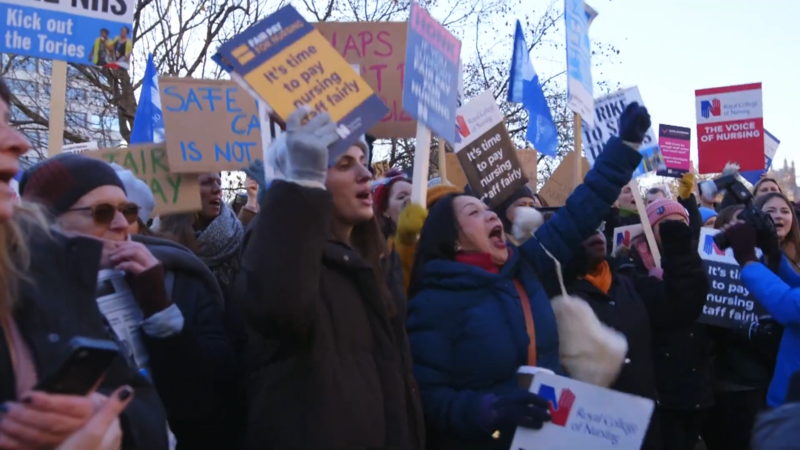Nearly half a million teachers and civil servants in the United Kingdom took what is the biggest industrial action over pay this week. This comes as unions have threatened more disruptive strikes until the government agrees to their pay demands.
On Wednesday, nearly 500,000 teachers, train drivers, and civil servants in the UK staged a mass walkout over pay in what is the biggest industrial action taken in recent months. The walkouts resulted in schools getting shut down, halting most rail services, and forcing the military to be placed on standby to assist in border checks on a day referred to as “Walkout Wednesday.”
The mass walkout also comes as trade unions have threatened to take more disruptive action unless the government agrees to their demands. Unions say as many as 300,000 teachers participated in the walkout, making them the biggest group involved in what is a wider action taken by 500,000 people, the highest number since 2011.
The Conservative government under Prime Minister Rishi Sunak has taken a more hardline stance against the unions, saying that giving in to the demands would only worsen the country’s inflation problem. Sunak has also condemned the strikes.
“I am clear that our children’s education is precious and they deserve to be in school today being taught,” said Sunak.
The PCS union, which represents around 100,000 civil servants from over 12 government departments that are going on strike, said that further coordinated strikes may be done unless the government tries to resolve the issue.
Meanwhile, the country’s pharmaceutical trade body called for the government to scrap the plans to raise the repayment rates for drugmakers in order to prevent potential setbacks. Drugmakers under the UK’s voluntary scheme agreement are required to pay a part of their drug revenue to the government. The Health and Social Care department plans on raising the repayment rate to 27.5 percent from 24.5 percent.
The government’s plans to raise repayment rates will likely send the “worst possible signal” to global investors and boardrooms, according to the Association of the British Pharmaceutical Industry.
“Hiking these clawbacks to such uncompetitive levels risks undermining the UK’s offer to global life sciences companies,” said ABPI chief executive Richard Torbett in a statement.



 Trump Allows Commercial Fishing in Protected New England Waters
Trump Allows Commercial Fishing in Protected New England Waters  Trump Signs Executive Order Threatening 25% Tariffs on Countries Trading With Iran
Trump Signs Executive Order Threatening 25% Tariffs on Countries Trading With Iran  South Korea Assures U.S. on Trade Deal Commitments Amid Tariff Concerns
South Korea Assures U.S. on Trade Deal Commitments Amid Tariff Concerns  Missouri Judge Dismisses Lawsuit Challenging Starbucks’ Diversity and Inclusion Policies
Missouri Judge Dismisses Lawsuit Challenging Starbucks’ Diversity and Inclusion Policies  U.S. to Begin Paying UN Dues as Financial Crisis Spurs Push for Reforms
U.S. to Begin Paying UN Dues as Financial Crisis Spurs Push for Reforms  China Warns US Arms Sales to Taiwan Could Disrupt Trump’s Planned Visit
China Warns US Arms Sales to Taiwan Could Disrupt Trump’s Planned Visit  Iran–U.S. Nuclear Talks in Oman Face Major Hurdles Amid Rising Regional Tensions
Iran–U.S. Nuclear Talks in Oman Face Major Hurdles Amid Rising Regional Tensions  Federal Judge Restores Funding for Gateway Rail Tunnel Project
Federal Judge Restores Funding for Gateway Rail Tunnel Project  India–U.S. Interim Trade Pact Cuts Auto Tariffs but Leaves Tesla Out
India–U.S. Interim Trade Pact Cuts Auto Tariffs but Leaves Tesla Out  Ohio Man Indicted for Alleged Threat Against Vice President JD Vance, Faces Additional Federal Charges
Ohio Man Indicted for Alleged Threat Against Vice President JD Vance, Faces Additional Federal Charges  Trump Endorses Japan’s Sanae Takaichi Ahead of Crucial Election Amid Market and China Tensions
Trump Endorses Japan’s Sanae Takaichi Ahead of Crucial Election Amid Market and China Tensions  Trump’s Inflation Claims Clash With Voters’ Cost-of-Living Reality
Trump’s Inflation Claims Clash With Voters’ Cost-of-Living Reality  U.S.-India Trade Framework Signals Major Shift in Tariffs, Energy, and Supply Chains
U.S.-India Trade Framework Signals Major Shift in Tariffs, Energy, and Supply Chains  U.S. Announces Additional $6 Million in Humanitarian Aid to Cuba Amid Oil Sanctions and Fuel Shortages
U.S. Announces Additional $6 Million in Humanitarian Aid to Cuba Amid Oil Sanctions and Fuel Shortages  Trump Backs Nexstar–Tegna Merger Amid Shifting U.S. Media Landscape
Trump Backs Nexstar–Tegna Merger Amid Shifting U.S. Media Landscape  Netanyahu to Meet Trump in Washington as Iran Nuclear Talks Intensify
Netanyahu to Meet Trump in Washington as Iran Nuclear Talks Intensify 































